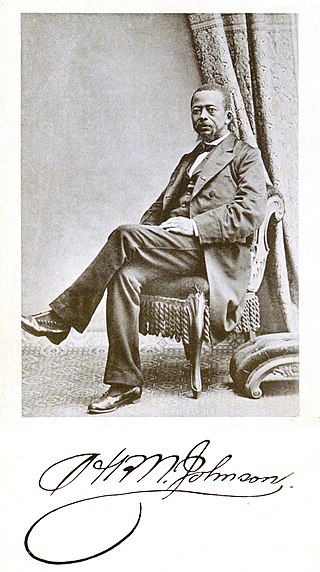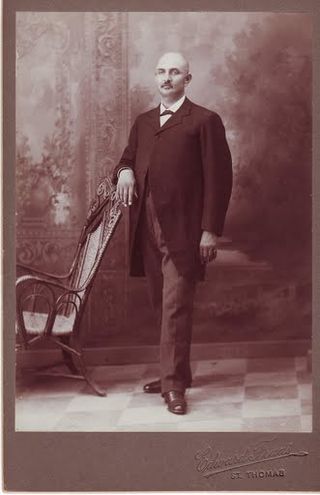Related Research Articles

Joseph Jenkins Roberts was an Americo-Liberian merchant who emigrated to Liberia in 1829, where he became a politician. Elected as the first (1848–1856) and seventh (1872–1876) president of Liberia after independence, he was the first man of African descent to govern the country, serving previously as governor from 1841 to 1848. He later returned to office following the 1871 Liberian coup d'état. Born free in Norfolk, Virginia, Roberts emigrated as a young man with his mother, siblings, wife, and child to the young West African colony. He opened a trading firm in Monrovia and later engaged in politics.

William David Coleman was an Americo-Liberian politician. A True Whig Party member, he served as the 13th president of Liberia from 1896 to 1900. Born in Fayette County, Kentucky, United States, he emigrated to Liberia in 1853. In 1877, he was elected to the House of Representatives and served as Speaker of the House of Representatives until 1879. Later he served in the Senate and then as vice president before assuming the presidency when Joseph James Cheeseman died in office.

Hilary Richard Wright Johnson served as the 11th president of Liberia from 1884 to 1892. He was elected four times. He was the first Liberian president to be born in Africa. He had served as Secretary of State before his presidency, in the administration of Edward James Roye.

Alfred Francis Russell was an Americo-Liberian missionary, planter, and politician who served as tenth president of Liberia from 1883 to 1884 after serving as vice-president under Anthony William Gardiner, whom he succeeded as president.

Mississippi-in-Africa was a colony on the Pepper Coast founded in the 1830s by the Mississippi Colonization Society of the United States and settled by American free people of color, many of them former slaves. In the late 1840s, some 300 former slaves from Prospect Hill Plantation and other Isaac Ross properties in Jefferson County, Mississippi, were the largest single group of emigrants to the new colony. Ross had freed the slaves in his will and provided for his plantation to be sold to pay for their transportation and initial costs.

Clarence Lorenzo Simpson Sr. (1896–1969) was a Liberian politician who served as the 22nd vice president and the speaker of the House of Representatives. He served also as Secretary of State during much of World War II (1934–1943) under President Edwin Barclay, and later as Liberia's ambassador to the United States.

Edward Wilmot Blyden was an Americo-Liberian educator, writer, diplomat, and politician who was primarily active in West Africa. Born in the Danish West Indies, he joined the waves of black immigrants from the Americas who migrated to Liberia. Blyden became a teacher for five years in the British West African colony of Sierra Leone in the early twentieth century. His major writing were on pan-Africanism which later became influential throughout West Africa, attracting attention in countries such as the United States as well. His ideas went on to influence the likes of Marcus Garvey, George Padmore and Kwame Nkrumah.
Samuel Alfred Ross was an Americo-Liberian politician and journalist who served as the 18th vice president of Liberia from 1920 to 1924 under President Charles D. B. King. Born in Greenville, Sinoe County, Liberia, he was the son of Joseph J. Ross, a native of the United States and also a former vice president of Liberia. Prior to his vice presidency, Samuel Ross served in the Senate and as the Liberia's Attorney General. He was presbyterian.

Christopher Harrison Payne was a prominent religious, educational, and political leader of the late nineteenth and early twentieth centuries. Born in the American South during the time of slavery, Payne rose to a level of prominence achieved by few, regardless of race. One of his many accomplishments include being the first African American elected to the West Virginia Legislature.
Events from the year 1799 in the United States.
Events from the year 1852 in the United States.
Joseph Gibson was an Americo-Liberian politician who served as the seventh vice president of Liberia under President James Spriggs Payne.

The 1980 Liberian coup d'état happened on April 12, 1980, when President William Tolbert was overthrown and murdered in a violent coup. The coup was staged by an indigenous Liberian faction of the Armed Forces of Liberia (AFL) under the command of Master Sergeant Samuel Doe. Following a period of transition, Doe ruled Liberia throughout the 1980s until his murder in 1990 during the First Liberian Civil War.

Americo-Liberian people, are a Liberian ethnic group of African American, Afro-Caribbean, and liberated Africans. Americo-Liberians trace their ancestry to free-born and formerly enslaved African Americans who emigrated in the 19th century to become the founders of the state of Liberia. They identified themselves as Americo-Liberians.
Laurence Bropleh is a Liberian Politician, Diplomat, United Methodist clergyman, lawyer, former Cabinet-Level government official, and business executive. Bropleh was Minister of information, Cultural Affairs and Tourism of the Republic of Liberia in the administration of President Ellen Johnson Sirleaf. He is the owner of a farm in Grand Bassa County and Law Practice on United Nations Drive in Monrovia. Bropleh received primary education in Liberia and advanced degrees including a Ph.D. in the United States.
Clarence Lorenzo SimpsonJr. (1933–2016) was a Liberian jurist and politician. He served as Associate Justice of the Supreme Court, Attorney General, and Minister of Justice of Liberia serving under both President William Tubman and President William Tolbert.
References
- ↑ "'Goldfinger' and the presidency". The Economist . 17 January 2014. ISSN 0013-0613 . Retrieved 23 October 2019.
- ↑ "25 years after his demise, Samuel Doe continues to cast a long shadow across Liberian politics". African Arguments. 9 September 2015. Retrieved 30 November 2015.